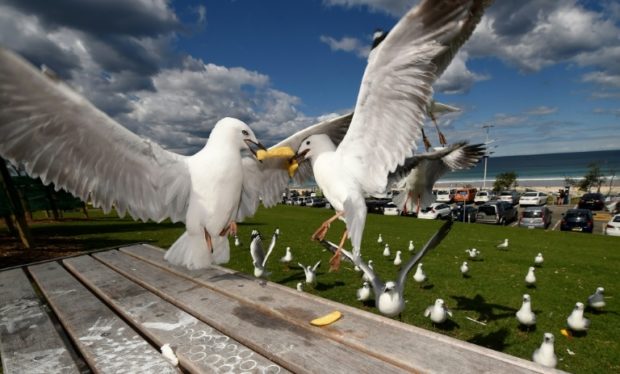Gulls could pass on drug-resistant bacteria to humans, scientists say

Scientists said 20% of silver gulls were thought to carry disease-causing bacteria that are resistant to antibiotics. Image: AFP/Peter Parks
Australian seagulls carry drug-resistant bacteria that could lead to serious infections in humans, researchers said on Wednesday, July 10.
The study comes as doctors globally sound the alarm over bacterial illnesses that are immune to modern medicine.
Scientists, led by a team from Perth’s Murdoch University, said 20% of silver gulls were thought to carry disease-causing bacteria that are resistant to antibiotics.
The gulls became infected after coming into contact with human feces, a report published this week in the Journal of Antimicrobial Chemotherapy suggested, likely through sewage or discarded diapers at garbage dumps.
Their study involved taking more than 550 samples from silver gulls around Australia and testing them for various bacteria.
“What we found, which we did not expect to find, was the high levels of resistant E Coli that the seagulls were carrying, that was quite unusual,” Murdoch University researcher Mark O’Dea told AFP.
“Quite a large number of the bacteria were actually human clones or human bacteria, so the seagulls had picked this up somehow from humans, they had not come directly as a seagull bacteria,” O’Dea added.
The study found more than 20% of the birds were carrying antibiotic-resistant bacteria that cause diseases like urinary tract infections and sepsis.
The World Health Organization has warned of the increasing threat of so-called superbugs, bacteria that have developed resistance to known antibiotics, and called for the urgent development of a new generation of drugs.
O’Dea said the risk of seagulls passing an infection to humans was “pretty negligible,” but could still occur.
Some of the bacteria were already resistant to “fairly significant” drugs, he said, adding that it was feared the gulls could spread the superbugs as they fly around the country. HM
RELATED STORIES:
Birds just wanna have fun: Like humans, cockatoos love to dance